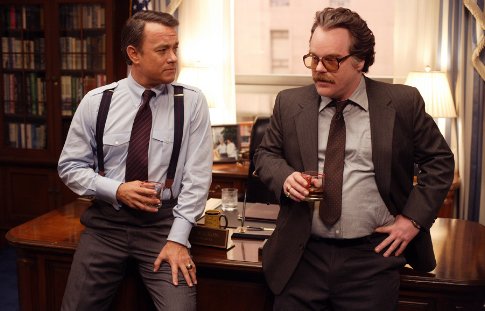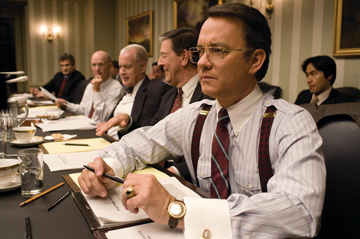Another personal plug: As part of the online rollout for a new edition of Walter LaFeber’s The American Century, I recently composed four brief classroom essays on various 20th century events, as evaluated from a 21st century (re: ruthlessly presentist) perspective. In case anyone’s interested, they’ve now gone live: The Versailles Conference | The Military Industrial Complex Speech | The Tet Offensive | A Second American Century? Now, that’s edutainment.
Tag: Diplomacy
Mr. Wilson Goes to Washington.

At one point in Mike Nichols’ smart, surprisingly enjoyable Charlie Wilson’s War, the freewheeling, fun-loving Representative Charles Wilson (Tom Hanks), he of the Texas 2nd Congressional District, tells his schlubby, foul-mouthed partner at the CIA, Gust Avrakotos (Philip Seymour Hoffman), “You ain’t James Bond.” Deadpans Avrakotos, “You ain’t Thomas Jefferson, so let’s call it even.” True, Bond and Jefferson they’re not, but that’s actually part of the appeal of Nichols’ lively little film. A strangely optimistic, almost Capraesque movie about the covert proxy war in Afghanistan (and, ultimately, the inadvertent role played by the U.S. in fostering the Taliban), Charlie Wilson’s War — adapted by The West Wing‘s Aaron Sorkin from the book by the late George Crile — is no grim, sober-minded edutainment. Moving at a brisk clip and maintaining a light touch — too light, some might argue — throughout, the movie instead depicts how a few (relatively) ordinary, committed people can change the world…provided one of them is sitting on the House Defense Subcommittee, and has stacked up a sizable amount of chits.
When — after a quick flash-forward setup — we first meet Congressman Charlie Wilson (Tom Hanks, eschewing the Pvt. Ryan earnestness for his more sardonic Bachelor Party/Volunteers side), he’s lounging in a Vegas hot tub with a coke-snorting television producer, a Playboy bunny, and two strippers. In short, he seems like a out-and-out cad. But there’s something endearing and even statesmanlike about his piqued interest in a 60 Minutes report, playing in the corner, on the mujahideen in Afghanistan. (Maybe it’s the Dan Rather Texas connection.) Delving further into the issue back in Washington, Wilson — exercising the power of his crucial committee position — singlehandedly doubles U.S. funding of the mujahideen from $5 million to $10 million. This by-all-accounts token gesture draws the attention of the wealthy Houston socialite Joanne Herring (Julia Roberts, solid), a woman with money, connections, and a fervent commitment to anticommunism, and she sends Wilson off to Pakistan to meet with President Zia-ul-Haq about the situation in neighboring Afghanistan. There, Wilson is moved to the cause by the sight of a dismal refugee camp, and soon enough, he’s enlisted an important ally in Avrakotos, a profane Langley veteran (Hoffman, showing yet another side after Before the Devil and The Savages this year, and nearly running away with the movie.) Together, these three — Wilson, Herring, Avrakotos (John Rambo’s unique contributions to the cause of Afghan freedom are sadly overlooked — set in motion a scheme not only to increase funding radically for the war but to funnel Soviet weaponry owned by Israel and Egypt to the freedom fighters there. Of course, some delicate diplomacy is required, and, in any case, giving Afghan youths an arsenal of helicopter-slaying RPGs doesn’t seem like such a great an idea in retrospect…
While nodding to the dismal events that follow American intervention in the region, Charlie Wilson’s War hardly dwells on the blowback, or on anything — a few refugee camp horror stories and a Pavel Lychnikoff cameo notwithstanding — that might interrupt its tone of hearty, back-slapping jocularity. (Supporting turns by Amy Adams, Emily Blunt, Ned Beatty, Denis O’Hare, John Slattery, and Peter Gerety help speed things along in a comfortable groove.) And yet, however feel-good, Wilson ultimately feels more ripped from the headlines than even the filmmakers could’ve guessed. Some lawmakers have trouble distinguishing between Pakistan and Afghanistan at one point, and Herring begins an introduction of Pakistan’s President by saying, “Zia did not kill Bhutto.” (Leavening the chill that follows this now-eerie moment, Rudy Giuliani and John Murtha also come up at various times as punchlines.)
But, its timeliness and prescience aside, what I found most impressive about Charlie Wilson’s War is how aptly it portrays the feel of Washington. This was somewhat surprising to me as, while I liked Sorkin’s The West Wing decently enough as a TV drama and admired its general idealism about politics, the show always felt rather fake to me. But, be it due to Crile or Sorkin or Nichols, Wilson conveys a lot of the telling details of life inside the Beltway quite well — the hallway horse-trading and neverending quid pro quos, the simultaneous meetings, the bland, institutional cafeterias; the bevy of youngish staffers (and inordinately pretty administrative assistants) on Capitol Hill, the deals crafted over dinner or drinks, the conference calls, the memory holes, myopic thinking, and CYA behavior. Outside of The Wire‘s nuanced take on the compromises of Baltimore city politics, it’s hard to think of a more on-target recent portrayal of the (non-campaigning) political process. Sadly, for Congressman Wilson as for today’s legislators, fiddling with the internal dynamics of far-flung nations we barely understand for short-term gain is All in the Game. Still, as Charlie Wilson’s War proves, don’t let it ever be said that nothing gets done in Washington.

Diplomats in Arms.
“Service in Iraq is ‘a potential death sentence,’ said one man who identified himself as a 46-year Foreign Service veteran. ‘Any other embassy in the world would be closed by now,’ he said to sustained applause.” Want to join the Foreign Service? Here’s your chance…US diplomats appear to be on the verge of mutiny over forced postings in Baghdad. “Foreign Service officers swear an oath to serve wherever the secretary of state sends them, but no directed assignments have been ordered since the late 1960s, during the Vietnam War…A poll conducted this month by the American Foreign Service Association found that only 12 percent of officers ‘believe that [Secretary of State Condoleeza] Rice is fighting for them’.”
The Queen II: The Joint Inheritance.
Speaking of US-international relations, with Frost/Nixon, The Queen, The Last King of Scotland and rewrites of State of Play and Tinker, Tailor, Soldier, Spy under his belt, British writer Peter Morgan now plans a sequel to The Queen “which will examine former UK Prime Minister Tony Blair’s relationships with U.S. presidents Bill Clinton and George W. Bush.” Michael Sheen is set to reprise his role as the PM, although director Stephen Frears is not returning.
Mischa the Bear or Ivan Drago?
“Dmitri Trenin, deputy director of the Carnegie Endowment’s Moscow center, put it well in an insightful article in Foreign Affairs, published a year ago. ‘Until recently,’ he wrote, ‘Russia saw itself as Pluto in the Western solar system, very far from the center but still fundamentally a part of it. Now it has left that orbit entirely. Russia’s leaders have given up on becoming part of the West and have started creating their own Moscow-centered system.'” With Dubya on the road for the G8 summit, Slate‘s Fred Kaplan surveys the state of US-Russian relations, concluding that “something is happening…[but w]e’re not — or at least there’s nothing inevitable about our becoming — enemies.“
As England Goes…?
“What all of this means is not that Basra is how we want it to be. But it does mean that the next chapter in Basra’s history can be written by Iraqis.” While the Dubya administration continue to press for its “surge,” Prime Minister Tony Blair announces the withdrawal of 1600 troops from Iraq, leaving approximately 5,500 British soldiers in the now Shiite-controlled region of Basra. [video.] “Anthony Cordesman, an Iraq expert at the Washington-based Center for Strategic and International Studies, said though the British and American strategies appear to be opposite, they will achieve the same end: a consolidation of Shiite power in Iraq. The British have already acquiesced to a ‘situation of quiet sectarian cleansing’ in the south, and their decision to pull out of Basra simply marks ‘acceptance of a political reality’ of Shiite control in the region.“
Nixon versus the Diplomats.
Also among the intriguing recent disclosures of the Nixon years are newly released State Department records which reveal further Nixon’s contempt for his Foreign Service. “Just before saying he was going ‘to take the responsibility for cleaning up’ the department, the president told Kissinger on November 13 that he was determined that ‘his one legacy is to ruin the Foreign Service. I mean ruin it — the old Foreign Service — and to build a new one. I’m going to do it.’“
Lulled into Security.
Jeffrey Sachs, take note: A new report finds that the best way to get the US to pony up some foreign aid for impoverished nations is to get that country on the Security Council, and pronto. “A two-year seat on the Security Council, for instance, can generate a 59 percent spike in U.S. assistance, according to a study by two Harvard University scholars that tracked U.S. economic and military assistance from 1946 to 2001. In times of crisis, U.S. aid to some member countries has increased by as much as 170 percent. Those aid levels tend to recede after the country leaves the 15-nation council.” So, great news, Panama…You just hit the jackpot.
Matters of State.
“The position of secretary of state is potentially the most fulfilling in the government short of the presidency. Its scope is global; ultimately it rests on almost philosophical assumptions as to the nature of world order and the relationship of order to progress and national interest.” In this past Sunday’s NYT Book Review, Henry Kissinger remembers his predecessor, Dean Acheson. “Acheson dealt with the issues Nixon put before him thoughtfully, precisely, without any attempt at flattery, in pursuit of his conception of national service and, unlike some other outside advisers, without offering advice that had not been solicited.“
Tribunes v. Tribunals.
“Purely from a strategic point of view, this is another mess…Every time Republicans think they have an issue to unite them and divide the Democrats, the Republicans end up spending most of the time fighting among themselves.” As fear-mongering and falling oil prices perhaps help the GOP get back in the race this November, the WP surveys the political implications of the recent stand of principle by Senators Warner, McCain, Graham, and Snowe against Dubya’s grotesque tribunal plan. Politics or no, Dubya’s proposed gutting of the Geneva Conventions must be stopped: “‘What is being billed as “clarifying” our treaty obligations will be seen as “withdrawing” from the treaty obligations,’ Graham said. ‘It will set precedent which could come back to haunt us.'”
